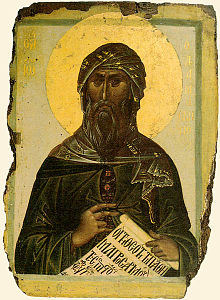
The Byzantine Empire lasted from AD 395 to 1453, during which music was prominent throughout the empire.[1][n 1] Both sacred and secular music were commonplace, with sacred music frequently used in church services and secular music in many events including, ceronmonies, dramas, ballets, banquets, festivals and sports games.[2][3] However, despite its popularity, secular Byzantine music was harshly criticized by the Church Fathers.[3][n 2] Like their medieval Western contemporaries, little is known about the lives of Byzantine composers.[5]
Composers of sacred music, especially hymns and chants, are generally well documented throughout the history of Byzantine music. However, those before the reign of Justinian I are virtually unknown; the monks Anthimos, Auxentios and Timokles are said to have written troparia, but only the text to a single one by Auxentios survives.[6] The first major form was the kontakion, of which Romanos the Melodist was the foremost composer. In the late 7th century the kanōn overtook the kontakion in popularity; Andrew of Crete became its first significant composer, and is traditionally credited as the genre's originator (though modern scholars now doubt this). The kañon reached its peak with the music of John of Damascus and Cosmas of Maiuma and later Theodore of Stoudios and Theophanes the Branded in the 8th and 9th centuries respectively.[2] Composers of secular music are considerably less documented. Not until late in the empire's history are composers known by name, with Joannes Koukouzeles, Xenos Korones and Joannes Glykys as the leading figures.[3] Partly due to the little information concerning them, many modern studies of Byzantine music pay little attention to specific composers.[7]
Like their Western counterparts of the same period, recorded Byzantine composers were primarily men.[5] The best known woman was Kassia, a prolific and important composer of sticheron hymns and the only woman whose works entered the Byzantine liturgy.[8] A few other women are known to have been composers, Thekla, Theodosia, Martha and the daughter of John Kladas (her given name is unrecorded).[9] Aside from Kassia, only the daughter of John Kladas has any surviving work, a single antiphon.[10] Some Byzantine emperors are known to have been composers, such as Leo VI the Wise, Constantine VII and possibly John III Doukas Vatatzes.[11]
- ^ Nicol, Donald MacGillivray (21 September 2021). "Byzantine Empire | History, Geography, Maps & Facts". Encyclopædia Britannica. Chicago: Encyclopædia Britannica, Inc. Retrieved 2 October 2021.
When did the Byzantine Empire exist?: The Byzantine Empire existed from approximately 395 CE—when the Roman Empire was split—to 1453.
- ^ a b c Levy 2001.
- ^ a b c d Touliatos 2001.
- ^ Randel, Don Michael, ed. (2003). The Harvard Dictionary of Music. Cambridge: Harvard University Press. pp. 751, 771. ISBN 978-0-674-01163-2.
- ^ a b Touliatos-Banker 1984, p. 62.
- ^ Cite error: The named reference
Metcalfewas invoked but never defined (see the help page). - ^ Velimirović 1978, p. 818.
- ^ Mellas 2020, pp. 147–148.
- ^ Touliatos-Banker 1984, pp. 64, 80.
- ^ Touliatos-Banker 1984, p. 64.
- ^ Kalaitzidis & Apostolopoulos 2015, §2 "Prominent Personalities".
Cite error: There are <ref group=n> tags on this page, but the references will not show without a {{reflist|group=n}} template (see the help page).